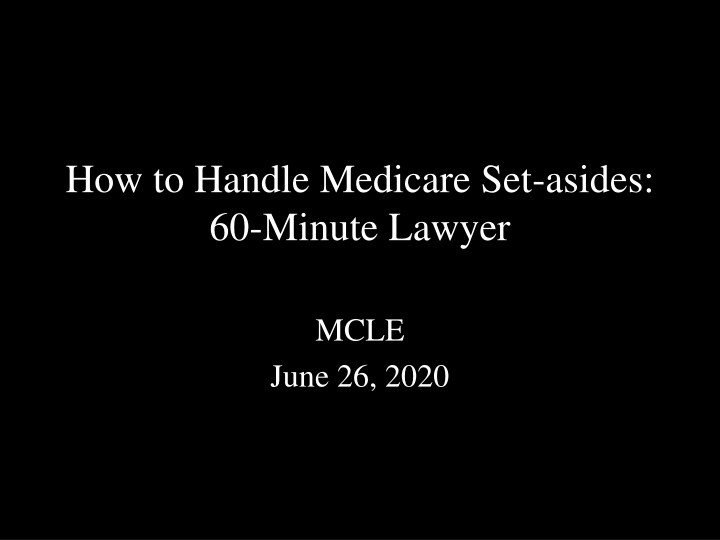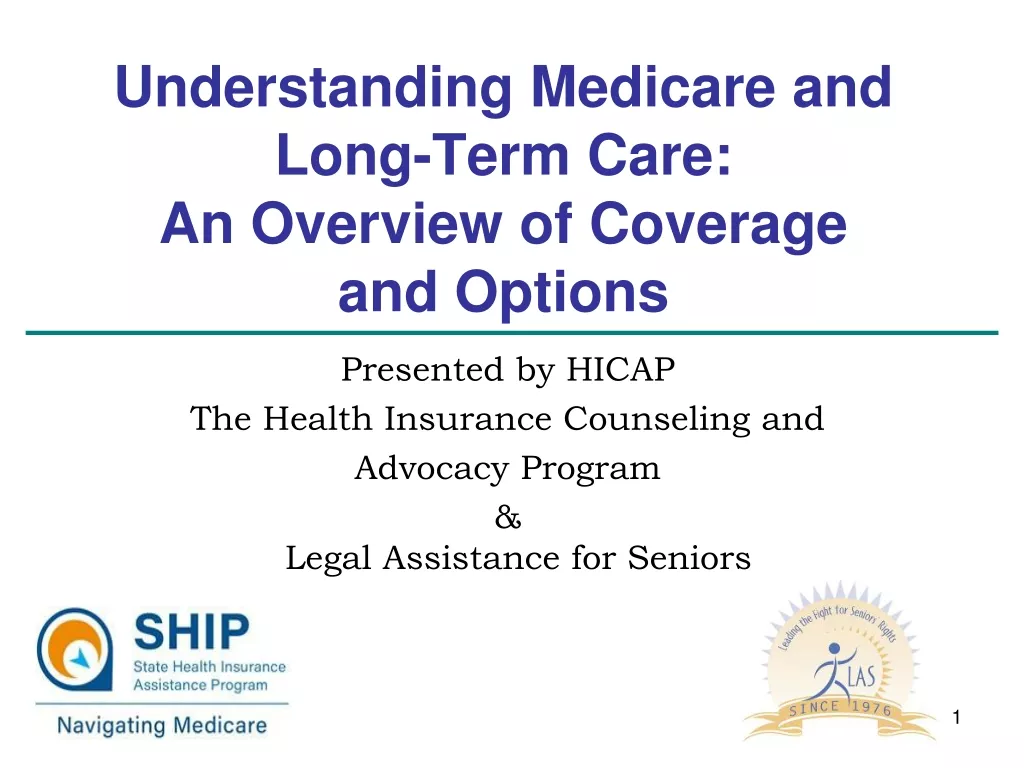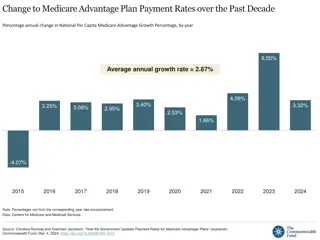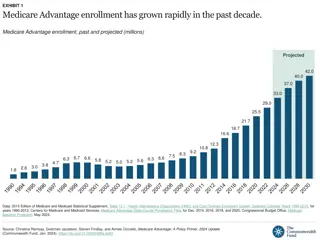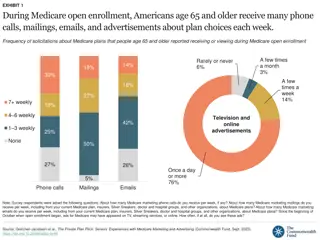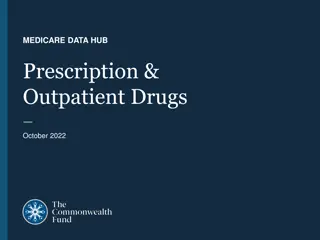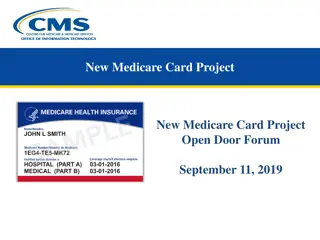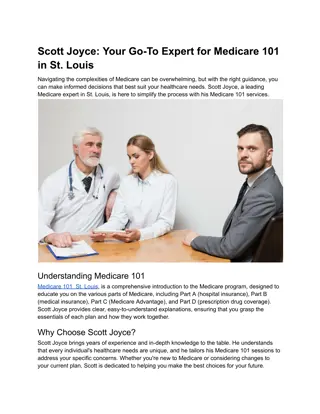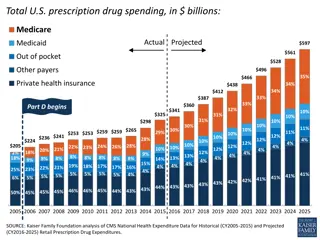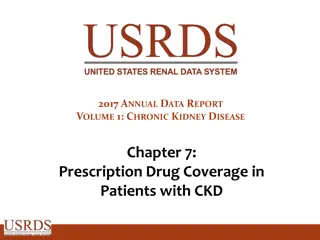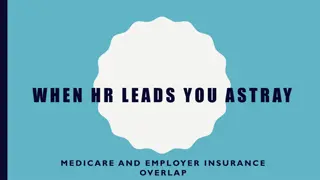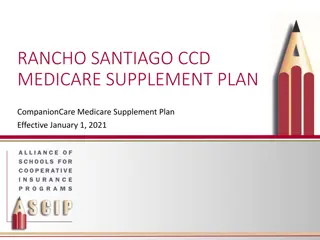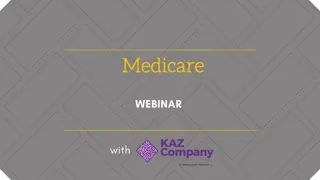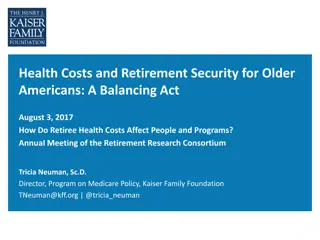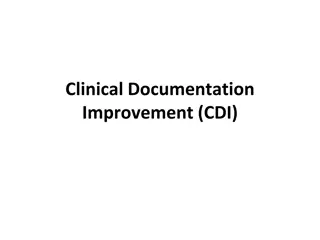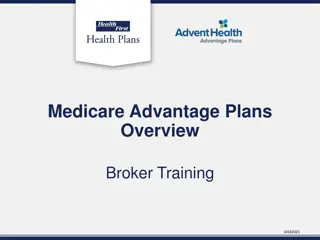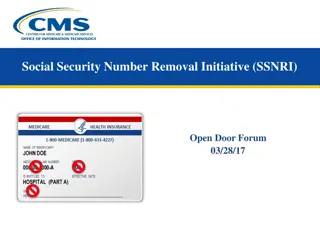Handling Medicare Set-Asides: Key Considerations and Compliance Updates
This comprehensive guide covers essential aspects of managing Medicare Set-Asides, including eligibility criteria, confirming Medicare status, compliance with the Medicare Secondary Payer Act, potential penalties for errors in reporting, and strategies to avoid violating the MSP statute. Stay informed on the latest CMS regulations and penalties to ensure proper handling of Medicare Set-Asides in legal cases.
Download Presentation

Please find below an Image/Link to download the presentation.
The content on the website is provided AS IS for your information and personal use only. It may not be sold, licensed, or shared on other websites without obtaining consent from the author.If you encounter any issues during the download, it is possible that the publisher has removed the file from their server.
You are allowed to download the files provided on this website for personal or commercial use, subject to the condition that they are used lawfully. All files are the property of their respective owners.
The content on the website is provided AS IS for your information and personal use only. It may not be sold, licensed, or shared on other websites without obtaining consent from the author.
E N D
Presentation Transcript
How to Handle Medicare Set-asides: 60-Minute Lawyer MCLE June 26, 2020
Please feel free to email or call with questions at any time. Christine Hummel Hummel Consultation Services Christine@hummelcs.com 603-758-1410 x 1
Medicare Eligibility Over age 65 Persons from Age 22 to 64: Social Security Disability. Minors and young adults: May be able to utilize a parent's work history to qualify for SSD and Medicare.
Medicare Eligibility How to Confirm Medicare Status/SSD status Defendant can query the injured person on the SSA database via the Section 111 reporting system. Plaintiff can provide a Benefits Verification statement from this website: https://www.ssa.gov/myaccount/ Remember to verify the plaintiff s SSD status periodically until the case is fully resolved.
The Medicare Secondary Payer Act 42 USC 1395y (December 1980) Three basic requirements: The Section 111 Reporting Requirement The Conditional Payment Reimbursement Maintain Medicare as Secondary Payer post- settlement
Can I completely avoid the MSP statute? $750.00 (Note: 2020 Threshold)
Newest Information February 18, 2020 CMS published a proposed Rule regarding Section 111 Civil Money Penalties (CMP) CMS is proposing that a CMP be assessed against an RRE when the RRE has an error reporting amount above the newly established error reporting threshold of 20%. If an RRE has an error rate of 20% in the Section 111 reporting for four out of eight consecutive reporting periods, then a CMP will be assessed.
Newest Information continued CMS is proposing a tiered system for penalties The first offense will result in a fine of $250.00 per day. The second offense will result in a fine of $500.00 per day. The third offense will result in a fine of $750.00 per day. The fourth offense will result in a fine of $1,000.00 per day.
Newest Information continued No CMP will be assessed if the following provisions can be documented: The RRE has communicated the need for identifying information to the Medicare beneficiary or their attorney. The RRE has made at least two written requests and one phone call or one electronic mail request for the necessary information. The RRE certifies that it has not received a response to its requests for the necessary information. The RRE has documented all efforts to obtain the necessary data to facilitate a Section 111 report or determine the need for a Section 111 report.
Newest Information continued The statute of limitations for CMP is 5 years from the date of when non- compliance was identified by Medicare. Case Law: Ruiz v Rhode Island (April 27, 2020): Liability case Case settled with no specific requirement in the release agreement that Mr. Ruiz provide the data necessary to verify his Medicare status. Mr. Ruiz refused to provide his SSN State did have 4 digits of the SSN and made over 100 queries to try and verify his Medicare status Court determined State s efforts to verify the Medicare status of Mr. Ruiz was done in good faith and should exempt the state from a CMP. Important to remember case decided before a final rule issued by CMS. Case speaks to the importance of ensuring the settlement agreement makes clear that payment of settlement funds is contingent on compliance with the MSP statute and that the Medicare beneficiary will cooperate when necessary to ensure such compliance is obtained.
Future Medical Allocations (MSA) 42 USC 1395Y(b)(2)(A)(ii): Requires that Medicare cannot make a payment with respect to any item or service to the extent that payment has been made, or can reasonably be expected to be made under a workmen s compensation law or plan or under an automobile or liability insurance policy or plan (including a self-insured plan) or under no fault insurance.
MSA continued What Is Missing? The magical phrase Medicare Set Aside But does this matter?
MSA continued Medicare Set Asides are TOOLS for compliance with the MSP statute s requirement that Medicare remain a secondary payer. The MSA is the preferred method for compliance with the MSP, but even CMS acknowledges there may be other ways to comply, but CMS has never approved any other financial method or tool for compliance with the MSP.
MSA Continued Your settlement is primary to Medicare if a claim for future medical (or permanent medical; lifetime medical) damages was claimed by the plaintiff and this claim is released as part of the settlement agreement. Practice Tip: Think carefully about how broadly you try to define the scope of the injuries.
MSA Continued Your settlement is primary to Medicare if a claim for future medical (or permanent medical; lifetime medical) damages was claimed by the plaintiff and this claim is released as part of the settlement agreement. Practice Tip: Think carefully about how broadly you try to define the scope of the injuries.
MSA Continued Is there any way to avoid an MSA (or future medical allocation) if a claim for future medical damages was made at some point in the history of the case? YES! CMS Memo issued September 29, 2011
MSA continued What if I cannot get the doctor s statement? What about case law? Aranki v. Burwell: October 16, 2015 out of Arizona. Duff vs Mass Gen (September 13, 2016) No Judge has ever stated the MSP statute and its requirement to keep Medicare secondary does not apply to Liability cases. Narrowly tailored questions to the court: does MSP Mandate use of a Medicare set Aside. This is not the same as asking the court to rule on the applicability of the MSP statute. Re-read the cases with fresh eyes !
MSA Continued What medical care does the MSA pay for? Medicare covered treatment related to the injury or illness in question Office visits, diagnostic imaging studies, physical therapy Surgery Medications Durable Medical Equipment Pain management injections Implantable devices
MSA Continued Ways to reduce the MSA exposure Rated ages If possible, see if the Plaintiff can be switched to generic medications or weaned off medications Surgery/implantable device statements: 1) Doctor and 2) Plaintiff. NOTE: CMS not legally bound by either statement.
MSA Continued Ways to reduce the MSA exposure cont. Obtain a treatment statement from the treating physician Treatment statement must come from the actual treating physician; not an IME or Second Opinion physician. *This approach may backfire; use caution. **42 CFR 411.47 is NOT a basis for reducing a future medical allocation. See July 11, 2005 CMS memorandum question/answer 11.
MSA Continued Can I get CMS approval of the MSA? For No Fault and Liability probably not, but you can try. This is likely to change at some point. For Workers Comp yes so long as the review thresholds are met.
MSA Continued With no formal MSA review process, how does CMS know the settlement is primary? And how much is primary? Section 111 Reporting Changes to the Common Working File effective October 1, 2017
MSA Continued Common Working File Changes (Effective: October 2017) Tells Medicare billing when to pay The Bulletin notifying of the change specifically states CMS is creating two new MSA processes: Liability and No Fault If no MSA is created, the case will be evaluated under current MSP policy. *MSP states the entire primary payment (settlement) is primary to Medicare.
MSA Continued November 8, 2017 CMS issued a MLN educational bulletin aimed at the Medical community. The title of the bulletin: Accepting Payment from Patients with Medicare Set- Aside Arrangements. Bulletin specifically tells medical providers that the Medicare is always a secondary payer to liability insurance (including self-insurance), no fault, and workers compensation.
MSA Continued December 2018: CMS issued an alert notifying the stakeholder community of its intent to publish a Notice of Proposed Rule Making by September 2019. NOTE: the NPRM is still unpublished. NPRM will address obligation of settlements to protect the Medicare trust fund. NPRM will provide options for compliance.
MSA Continued Companion Workers Compensation Claim What is the status of the WC claim now? If the WC claim closed out medical, did they do an MSA? If the WC claim is open, will WC continue to pay medical benefits after your liability settlement? Never lose track of the WC claim.
MSA Continued MSA Funding Lump Sum Annuity MSA Administration Self-Administration Self-Administration with Assistance Professional Custodian/Trustee
MSA Continued Medicaid Recipients (Dual Eligibles) MSA funds are countable assets Must use SNT or Pooled/community trust to preserve on-going Medicaid eligibility. If Medicaid recipient receives MSA funds directly they will be disqualified from Medicaid.
MSA continued What fee schedule is used when calculating an MSA? Actual charges Possibly workers compensation fee schedule NEVER: Medicare Fee Schedule Medical bills must be paid utilizing the fee schedule used to calculate the MSA.
MSA Continued How long does the money have to stay in the MSA account? What happens to the MSA funds at the death of the beneficiary?
Medicare Conditional Payments: Parts A, B, C, and D
Conditional Payments Statutes and Regulations (A, B, C, D) 42 USC 1395y(b)(2)(B) 42 CFR 411.24 42 CFR 411.26 (subrogation and right to intervene) 42 CFR 411.39 (Final CP Process) 42 CFR 411.50 42 CFR 411.52 42 CFR 411.108 (Part C) 42 CFR 423.462 (Part D) 42 CFR 401.613 (Compromise)
Conditional Payments Continued Conditional Payment: Payments made by Medicare for the accident related injury from the Date of Injury to the Date of Settlement. Two Contractors do Conditional Payment Searches for Medicare A/B: Benefits Coordination and Recovery Center (BCRC) and Commercial Repayment Center (CRC) Medicare Part C (advantage plans) and Part D(drug) plans are administered by private health companies. Payments by Part C and D plans do not appear on letters or notices issued by the BCRC or CRC.
Conditional Payments: General Medicare can recover, as conditional payments, any payment(s) paid by the Medicare program for the injury/illness from the date of injury (or date of Medicare entitlement) to the date of settlement. Plan Ahead: It will take the Medicare Contractor a minimum of 30-45 days to provide a tentative conditional payment letter or notice.
Conditional Payments: General Medicare can seek recovery for any payment with a date of service prior to your date of settlement even if the bill is paid after your settlement. If an expensive item (surgery) is not included in the tentative conditional payment letter; do some research and find out how the bill was paid. If billed to Medicare, notify the contractor of the excluded costs and ask for a revised letter.
Conditional Payment: General Disputes and appeals will also take a minimum of 45 to 60 days to process. Unless utilizing the Final CP process, the Final Demand amount cannot be obtained from Medicare until after you have finalized your settlement and signed a legally binding settlement agreement. *The date of your mediation or arbitration is not the date of settlement if your state requires execution of a settlement agreement.
Conditional Payment: General Make sure all parties agree on the Date of Injury. Make sure all parties agree on the date of settlement.
Conditional Payment: Final CP Process 42 CFR 411.39 January 1, 2016 Allows parties to settlement to request the final demand amount prior to finalizing settlement. Must complete the process within 120 days Can appeal each conditional payment one time Must sign settlement agreement within three days AFTER final demand requested.
Conditional Payment: Final CP Process 42 CFR 411.39(d): Obligations with Respect to Future Medical: Final conditional payments obtained via the web portal represent Medicare covered and otherwise reimbursable items and services related to the Beneficiary s settlement, judgement, award, or other payment.
Conditional Payment: Final CP Process The Final CP Process is only available for Workers Compensation and Liability settlements. It is not available for No Fault settlements. The exact language from CMS is the process may be available; which means it may not be available for all cases.
Conditional Payment: Misc 42 CFR 411.46 Work Comp Allows CMS to disregard the date of settlement Allows CMS to seek recovery of post-settlement Medicare Payments if the workers compensation settlement is burden shifting Unknown if this CFR section is applicable outside of workers compensation.
Conditional Payment: Misc. The CMS system can only handle one type of claim file per date of injury. Therefore, if a plaintiff brings a case against multiple liability defendants, the system can only handle the first reported liability case. All subsequent cases will be handled at the time of settlement.
Conditional Payment: Misc. Automobile cases that have both a liability and no fault (PIP/Med Pay) claim, will have two lien search processes: one with the CRC one with the BCRC
Conditional Payment: Misc. CMS can still seek recovery from the Primary Plan or Payer even if they are not the initial primary debtor of record on a file (42 CFR 411.24(i)). If it is necessary for CMS to take legal action to recover the conditional payment amount from the primary payer, CMS may recover twice the amount. (42 CFR 411.24 (c)(2) ). CMS can either assert a recovery action against the primary payer (42 USC1395(b)(2)(B)(iii)) or against any entity that received payment from the primary payer or proceeds from a payment made by the primary payer including the attorney representing the Medicare beneficiary (42 CFR 411.24(g)). See: United States v. Paul J. Harris
Conditional Payment: Misc If Plaintiff will be handling the conditional payment search; ensure defendant receives a copy of all correspondence to and from CMS/BCRC. Plaintiff will always be copied on correspondence from CMS.
Conditional Payment: Misc. Remember: Each Settlement is required to do its own conditional payment search. A prior conditional payment search, even if for the same date of incident, does not satisfy your requirement to give notice of settlement and do a conditional payment search.
Conditional Payment: Misc If the Final Demand amount is not paid timely, an Intent to Refer notice will be sent. Intent to Refer = Department of Treasury. Do Not let it get to Treasury!
Conditional Payment: Misc If no conditional payment search is started, CMS will automatically check for conditional payments at the time of the defendant s Section 111 report of settlement. Conditional Payments must still be reimbursed even if the plaintiff has died.
Conditional Payment: Self-Calculation Available for Liability Cases (conflicting information for work comp and no-fault) Must settle for $25,000.00 or less Must be done with all treatment for 90 days Date of incident must have occurred at least six months ago Must be a physical trauma injury; cannot be caused by ingestion, exposure, or implanted device.
Conditional Payment: Fixed Percentage Available for Liability cases Must settle for $5,000.00 or less Physical trauma based injury Must request within specific timeframe No final demand letter issued No other settlement dollars anticipated or expected
